 Read time 5 min
Read time 5 minEscrow accounting is vital in real estate transactions, providing a financial safeguard that ensures compliance and accuracy. This is crucial because the amount of money held in escrow can be quite substantial, typically ranging from 1-5% of the purchase price and potentially as much as 10% in cases involving new home constructions with builders. Managed by entities like brokers or escrow companies, these accounts are subject to varied regional regulations.
Effective escrow management is crucial for legal compliance, necessitating a deep understanding of its role and challenges in real estate. This article delves into these aspects, offering insights into the indispensable function of escrow accounting in property transactions.
Understanding Escrow Accounting in Real Estate
In real estate, escrow accounting refers to the process where a neutral third party holds and manages funds, property deeds, or other assets during a transaction. The purpose is to ensure that no funds or property are transferred until all terms and conditions have been met. There are two main types of escrow accounts in real estate transactions:
- Mortgage Escrow Account: Set up by mortgage lenders to pay property-related expenses on behalf of the borrower.
- Real Estate Escrow Account (Pre-Closing): Holds all funds, instructions, and paperwork necessary for the impending sale, including down payments and property deeds.
The escrow process involves multiple parties: the buyer, seller, lender, and the escrow agency. Each party contributes to drafting the escrow agreement, which is then managed by the escrow officer.
The process culminates in the escrow closing, marking the legal transfer of title from seller to buyer.
Compliance Challenges and Solutions
Escrow accounting faces several compliance challenges in real estate:
- Breach of Trust Fund Integrity: Instances where brokers inappropriately mix funds or neglect proper record-keeping.
- Lack of Adequate Oversight: Occasions when real estate brokers fail to adequately monitor the actions of their agents.
- Unauthorized Practice: Permitting individuals without a license to engage in activities that legally require licensure.
- False Representation: Providing misleading information or failing to disclose important details in a transaction.
Meeting transaction deadlines is also crucial. A poorly managed transaction can result in financial issues and stall the deal.
Solutions
To address these challenges, real estate professionals must adhere to stringent record-keeping requirements. State laws dictate the type of information to record and the methods for storing these records.
Key areas include maintaining a systematic filing system, ensuring responsibility for important actions, and verifying that all necessary disclosures are in place.
Brokers must review key documents like listing and purchase agreements to ensure compliance. Failing to demonstrate that these documents have been reviewed by an authorized person can result in a failed real estate compliance audit.
In a notable case, discrepancies in a law firm’s real estate trust account exceeded $176,000 due to embezzlement and disorganized bookkeeping.
This incident highlights the dire consequences of non-compliance and the importance of rigorous escrow accounting practices.
Ensuring Accuracy in Transactions
Ensuring accuracy in escrow accounting is vital for maintaining the integrity of real estate transactions. Here are methods and advanced technological tools to ensure precision:
- Regular Account Reconciliation: It’s critical to regularly reconcile accounts, including bank statements, credit cards, and vendor statements. This practice helps identify and correct discrepancies or errors promptly, ensuring the integrity of financial records.
- Detailed and Organized Records: Keeping well-organized records, including categorizing and storing all financial documents like invoices, receipts, and bank statements, is vital. This organization aids in easy tracking and verification of transactions.
- Implementing Internal Controls: Establishing internal controls such as segregation of duties, approval processes, and regular audits can significantly reduce the risk of errors or fraudulent activities. This approach involves multiple personnel in crucial financial processes, enhancing accuracy and security.
- Utilizing Accounting Software: Reliable accounting software can streamline record-keeping and reduce human error. These tools automate calculations, track transactions, and generate accurate financial reports.
- Periodic Financial Reviews: Regular reviews of financial statements and reports are essential. They help identify discrepancies or unusual trends, allowing for timely investigation and correction of errors.
- Training and Development: Investing in training programs ensures that accounting personnel have the necessary skills to execute their duties accurately and efficiently.
- AI and Machine Learning: Artificial Intelligence and machine learning have revolutionized accounting by automating tasks like data entry, transaction matching, and anomaly detection. These technologies can analyze large data volumes to identify patterns, anomalies, and fraud, thus improving decision-making and financial strategy optimization.
Risk Management Strategies
Managing risks in escrow accounting involves understanding and mitigating various potential threats:
- Categories of Risk: Risks can be categorized into preventable, strategy, and external risks. Preventable risks relate to internal management, strategy risks involve anticipated risks for strategic returns, and external risks are uncontrollable factors like the pandemic.
- Specific Risks: Accountants face specific risks like cybercrime, which can lead to data breaches and significant legal and financial consequences. Compliance with accounting board and state law requirements is crucial to avoid fines, penalties, or criminal investigations. Additionally, managing online reputation is vital as bad reviews can significantly impact new client acquisition.
Risk Management Steps:
- Identify: Identify areas of vulnerability within your business, considering various types of risks.
- Analyze: Estimate the potential severity of each risk and rank them according to severity.
- Minimize: Develop strategies to mitigate the worst-case scenarios, such as purchasing insurance, enhancing digital security, or establishing codes of conduct.
- Communicate: Train staff in the established risk management procedures.
- Monitor: Keep the risk management plan agile and evolve strategies when needed, being ready to identify and mitigate new risks as they arise.
Leveraging Technology for Enhanced Efficiency
In escrow accounting, technology plays a crucial role in streamlining processes and enhancing efficiency. Key aspects of this technological integration include:
- Escrow Processing Software: This digital solution automates and streamlines the escrow process, offering features such as transaction management, automated workflows, secure document storage, reporting, and integration capabilities.
- Benefits of Escrow Processing Software: The software enhances efficiency by automating manual tasks, reduces administrative burden, and improves transaction security. It also provides transparent transaction tracking and facilitates seamless collaboration between parties.
- Key Features to Consider: When choosing escrow processing software, evaluate factors like security, compliance, customization, user-friendliness, and integration capabilities to ensure that the software meets specific business needs.
Springbord’s Expertise in Escrow Accounting
Springbord, a leader in real estate accounting services, leverages technology and expertise to offer state-of-the-art solutions:
- Comprehensive Services: Springbord provides services such as bank reconciliation, accounts payable, accounts receivable, general ledger management, financial reporting, and budgeting and forecasting. Each service is designed to enhance accuracy and efficiency in escrow accounting processes.
- Strategic Outsourcing and Technology Utilization: By combining advanced technology, skilled personnel, and efficient processes, Springbord delivers custom accounting solutions, ensuring timely, transparent, and accurate information flow.
- Industry Recognition and Clientele: Springbord’s expertise in property financing services is evident in its diverse client base, including commercial offices and retail centers. Its commitment to accuracy and data security is demonstrated through its ISO/IEC 27001:2013 certification and adherence to precision benchmarks.
- Cost-Effective Solutions: Our company’s approach not only ensures high-quality service but also offers cost efficiency, reducing expenses by up to 50% while maintaining seamless document management.
Conclusion
Expert escrow accounting is a cornerstone of successful real estate transactions, ensuring accuracy, compliance, and security. Springbord’s comprehensive expertise in this domain stands as a testament to its ability to meet and exceed the intricate demands of business owners.
With a blend of advanced technology, skilled professionals, and a deep understanding of real estate finance, Springbord offers tailored solutions that are both efficient and cost-effective.
For business owners seeking expert escrow accounting services, Springbord is the ideal partner. To explore customized solutions that align with your specific requirements, we invite you to contact Springbord. Engage with our team to leverage our expertise and enhance the efficiency and accuracy of your real estate transactions.
For further information, please reach out. Let us help you achieve streamlined, secure, and successful real estate financial management.







